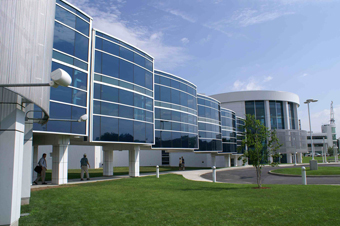NanoCollege Awarded Nearly $5M in Federal Funding to Enable Nanotechnology Research and Education
Initiatives will support nanoscale innovation and workforce training across a variety of critical sectors

The College of Nanoscale Science and Engineering has received nearly $5 million in federal funding to support education, research and workforce development initiatives.
ALBANY, N.Y. (January 12, 2011) --
UAlbany's College of Nanoscale Science and Engineering (CNSE) announced the receipt of nearly $5 million in federal funding awards to support innovative research and education in a host of critical areas, including nanotechnology-enabled clean energy technologies, nanomedicine, nanoelectronics, and nanoscale education and workforce training.
The awards were made through a variety of federal agencies and programs, including the National Science Foundation, the National Institutes of Health, American Recovery and Reinvestment Act, U.S. Department of Energy and the U.S. Army Research Laboratory.
 |
With over $6.5 billion in high-tech investments, the 800,000-square-foot College of Nanoscale Science and Engineering complex attracts corporate partners from around the world and offers students a one-of-a-kind academic experience. |
"These federal funding awards further underscore UAlbany's College of Nanoscale Science and Engineering as a nexus for world-class education and groundbreaking research and development in the emerging science of nanotechnology," said UAlbany President George M. Philip. "The addition of these vital resources will create new opportunities for our students and faculty, and continue to enhance a program that is already recognized as the best of its kind in the world."
Dr. Alain E. Kaloyeros, Senior Vice President and Chief Executive Officer of CNSE, said, "I salute the efforts of CNSE professors Haldar, Carpenter, Hartley, Sharfstein, Yu, Oktyabrsky and Geer, as well as CNSE research scientist Dalavoy, in receiving these prestigious federal grants. Their work will accelerate the pioneering education and innovative research at the UAlbany NanoCollege, while also supporting the critical mission of commercializing nanoscale technologies to address the most important issues facing society, from nanoelectronics and information technologies that drive nearly every facet of our economy, to improved health care and clean, environmentally friendly energy that is essential for our future."
More than $2.2 million in funding will support initiatives focused on clean energy and environmental technologies, including programs for design, development and prototyping of novel nanomaterials for advanced solar photovoltaic manufacturing led by Dr. Pradeep Haldar, CNSE Vice President for Clean Energy Programs and Professor and Head of CNSE's Nanoengineering Constellation; research on the relationship between environmental conditions and nanoscale properties, led by Dr. Michael Carpenter, CNSE Associate Professor of Nanoengineering, and Dr. John Hartley, CNSE Professor of Nanoengineering and Director of CNSE’s Advanced Lithography Center; and design, construction and assessment of an artificial photosynthetic system to generate hydrogen fuel or convert carbon dioxide to liquid fuels, such as methanol, led by CNSE Research Scientist Tulika Dalavoy.
Funding totaling more than $1.2 million will support nanomedicine research led by Dr. Susan Sharfstein, CNSE Associate Professor of Nanobioscience, targeting development of a metabolically engineered form of Heparin, the most widely used anticoagulant drug in modern medicine, and monoclonal antibodies to improve biopharmaceuticals used to treat diseases ranging from breast cancer to rheumatoid arthritis.
Nearly $700,000 was awarded for separate nanoelectronics research projects led by Dr. Bin Yu, CNSE Professor of Nanoengineering, and Dr. Serge Oktyabrsky, CNSE Professor of Nanoscience. Those efforts investigate the use of quantum confined excitons, replacing electrons, for information transmission in 2-D carbon nanostructures, and enabling of several generations of scaling for integrated circuits, respectively.
And, a $700,000 award will enable Dr. Robert Geer, CNSE Vice President for Academic Affairs, Chief Academic Officer and Professor of Nanoscience, to develop a cutting-edge curriculum to provide advanced nanochip fabrication education and workforce training to students in nanotechnology-related degree programs across the state.
With this latest announcement, CNSE has now received more than $10 million in federal funding awards over the past year.
CNSE is the first college in the world dedicated to education, research, development, and deployment in the emerging disciplines of nanoscience, nanoengineering, nanobioscience, and nanoeconomics. CNSE's Albany NanoTech Complex is the most advanced research enterprise of its kind at any university in the world. With over $6.5 billion in high-tech investments, the 800,000-square-foot complex attracts corporate partners from around the world and offers students a one-of-a-kind academic experience.The UAlbany NanoCollege houses the only fully-integrated, 300mm wafer, computer chip pilot prototyping and demonstration line within 80,000 square feet of Class 1 capable cleanrooms. More than 2,500 scientists, researchers, engineers, students, and faculty work on site, from companies including IBM, AMD, GlobalFoundries, SEMATECH, Toshiba, Applied Materials, Tokyo Electron, ASML, Novellus Systems, Vistec Lithography and Atotech. An expansion currently in the planning stages is projected to increase the size of CNSE's Albany NanoTech Complex to over 1,250,000 square feet of next-generation infrastructure housing over 105,000 square feet of Class 1 capable cleanrooms and more than 3,750 scientists, researchers and engineers from CNSE and global corporations.
![]() For more news, subscribe to UAlbany's RSS headline feeds
For more news, subscribe to UAlbany's RSS headline feeds
Educationally and culturally, the University at Albany-SUNY puts "The World Within Reach" for its 18,000 students. An internationally recognized research university with 58 undergraduate majors and 128 graduate degree programs, UAlbany is a leader among all New York State colleges and universities in such diverse fields as public policy, nanotechnology and criminal justice. With a curriculum enhanced by 300 study-abroad opportunities, UAlbany launches great careers. For more information about this globally ranked University, visit https://www.albany.edu/. For UAlbany's extensive roster of faculty experts, visit www.albany.edu/news/experts.shtml.


